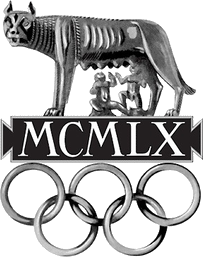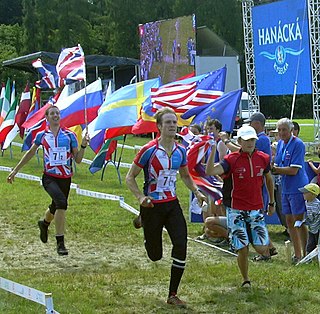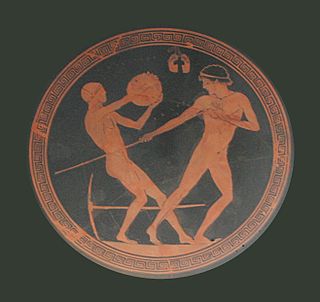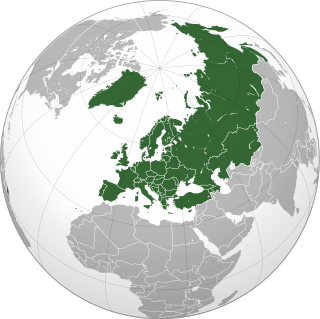
Estonia team have competed at the Special Olympics World Games since after regaining independence in 1991 and have won over 100 medals at the games. [1]

Estonia team have competed at the Special Olympics World Games since after regaining independence in 1991 and have won over 100 medals at the games. [1]
| Event | Gold | Silver | Bronze | Total | Ranking | Athletes |
|---|---|---|---|---|---|---|
| 1991 Special Olympics World Summer Games | 2 | 1 | ||||
| 1995 Special Olympics World Summer Games | ||||||
| 1999 Special Olympics World Summer Games | ||||||
| 2003 Special Olympics World Summer Games | 3 | 1 | 3 | 7 | 7 | |
| 2007 Special Olympics World Summer Games | 4 | 4 | 5 | 13 | 8 | |
| 39 [2] |
Best performances in bold.
| Event | Gold | Silver | Bronze | Total | Ranking | Athletes |
|---|---|---|---|---|---|---|
| 1993 Special Olympics World Winter Games | 0 | 0 | 0 | 0 | ||
| 1997 Special Olympics World Winter Games | 5 | 7 | 4 | 16 | 8 | |
| 2001 Special Olympics World Winter Games | 10 | 4 | 3 | 17 | 8 | |
| 2005 Special Olympics World Winter Games | 4 | 3 | 1 | 8 | 8 | |
| 51 (49 [2] ) |
Best performances in bold.

The 1980 Summer Olympics, officially known as the Games of the XXII Olympiad and commonly known as Moscow 1980, were an international multi-sport event held from 19 July to 3 August 1980 in Moscow, Soviet Union, in present-day Russia. The games were the first to be staged in an Eastern Bloc country, as well as the first Olympic Games and only Summer Olympics to be held in a Slavic language-speaking country. They were also the only Summer Olympic Games to be held in a self-proclaimed communist country until the 2008 Summer Olympics held in China. These were the final Olympic Games under the IOC Presidency of Michael Morris, 3rd Baron Killanin before he was succeeded by Juan Antonio Samaranch, a Spaniard, shortly afterwards.

The 1960 Summer Olympics, officially known as the Games of the XVII Olympiad and commonly known as Rome 1960, were an international multi-sport event held from 25 August to 11 September 1960 in Rome, Italy. Rome had previously been awarded the administration of the 1908 Summer Olympics, but following the eruption of Mount Vesuvius in 1906, the city had no choice but to decline and pass the honour to London. The Soviet Union won the most gold and overall medals at the 1960 Games.

The 1992 Winter Olympics, officially known as the XVI Olympic Winter Games and commonly known as Albertville '92, was a winter multi-sport event held from 8 to 23 February 1992 in and around Albertville, France. Albertville won the bid to host the Winter Olympics in 1986, beating Sofia, Falun, Lillehammer, Cortina d'Ampezzo, Anchorage, and Berchtesgaden. The 1992 Winter Olympics were the last winter games held in the same year as the Summer Olympics. The Games were the fifth Olympic Games held in France and the country's third Winter Olympics, after the 1924 Winter Games in Chamonix and the 1968 Winter Games in Grenoble. This games was the first of two consecutive Olympic games to be held in Western Europe, preceding the 1992 Summer Olympics in Barcelona, Spain.

A relay race is a racing competition where members of a team take turns completing parts of racecourse or performing a certain action. Relay races take the form of professional races and amateur games. Relay races are common in running, orienteering, swimming, cross-country skiing, biathlon, or ice skating. In the Olympic Games, there are several types of relay races that are part of track and field. Relay race, also called Relay, is a track-and-field sport consisting of a set number of stages (legs), usually four, each leg run by different members of a team. The runner finishing one leg is usually required to pass the next runner a stick-like object known as a "baton" while both are running in a marked exchange zone. In most relays, team members cover equal distances: Olympic events for both men and women are the 400-metre and 1,600-metre relays. Some non-Olympic relays are held at distances of 800 m, 3,200 m, and 6,000 m. In the less frequently run medley relays, however, the athletes cover different distances in a prescribed order—as in a sprint medley of 200, 200, 400, 800 metres or a distance medley of 1,200, 400, 800, 1,600 metres.

A pentathlon is a contest featuring five events. The name is derived from Greek: combining the words pente (five) and -athlon (competition). The first pentathlon was documented in Ancient Greece and was part of the Ancient Olympic Games. Five events were contested over one day for the Ancient Olympic pentathlon, starting with the long jump, javelin throwing, and discus throwing, followed by the stadion and wrestling. Pentathletes were considered to be among the most skilled athletes, and their training was often part of military service—each of the five events in the pentathlon was thought to be useful in war or battle.

A European Championship is the top level international sports competition between European athletes or sports teams representing their respective countries or professional sports clubs.

Olympic sports are contested in the Summer Olympic Games and Winter Olympic Games. The 2020 Summer Olympics included 33 sports; the 2022 Winter Olympics included seven sports. Each Olympic sport is represented by an international governing body, namely an International Federation (IF).

The United States competed at the 1972 Summer Olympics in Munich, West Germany. 400 competitors, 316 men and 84 women, took part in 185 events in 21 sports.
Olympic records are the best performances in a specific event in that event's history in either the Summer Olympic Games or the Winter Olympic Games, including:

Australia competed at the 1992 Winter Olympics in Albertville, France. 23 athletes competed, participating in alpine skiing, biathlon, bobsleigh, cross-country skiing, figure skating, freestyle skiing, luge, short track speed skating, and speed skating. Freestyle skiing and short-track speed skating were medal events for the first time, and Australia has competed in these events in every games since. Australia's best result at these games was seventh in the 5000 metres short-track relay.

Mongolia sent a delegation to compete at the 2002 Winter Olympics in Salt Lake City, United States from 8–24 February 2002. This was Mongolia's tenth time participating in a Winter Olympic Games. The delegation consisted of four athletes, two cross-country skiers; Davaagiin Enkhee and Jargalyn Erdenetülkhüür, as well as two short-track speed skating competitors; Battulgyn Oktyabri and Ganbatyn Jargalanchuluun. Erdenetülkhüür placed 63rd in the men's 15 kilometre classical cross-country race; he was the only one of the four to compete in an event final.

The Indiana State Sycamores are the NCAA Division I intercollegiate athletic teams of Indiana State University. Since the 1977–78 academic year, Indiana State has been a member of the Missouri Valley Conference (MVC). The Indiana State football team has competed in Division I FCS since the 1982 season, and has been a member of the Missouri Valley Football Conference (MVFC) since it was spun off from the Gateway Collegiate Athletic Conference (Gateway) when the latter league merged into the MVC in 1992. Past conference memberships include the Indiana College Athletic League (1895–1922), the Indiana Intercollegiate Conference (1922–1950), the Indiana Collegiate Conference (1950–1968) and the Midwestern Conference (1970–1972). The women's teams were Gateway members from the league's 1982 founding until its absorption by the MVC. In 1986, a year after the Gateway took on football as its only men's sport, the Sycamores football team joined that conference.
The men's 15 kilometre freestyle cross-country skiing competition at the 2010 Winter Olympics in Vancouver, Canada, was held on 15 February at Whistler Olympic Park in Whistler, British Columbia, at 12:30 PST.

Denmark made its Paralympic Games début at the 1968 Summer Paralympics in Tel Aviv with a delegation of eight competitors, in swimming and table tennis. The country has participated in every subsequent edition of the Summer Paralympics, and in every edition of the Winter Games since 1980.

During the 2012 Summer Olympics in London, United Kingdom, Saint Vincent and the Grenadines appeared in their seventh consecutive Summer Olympics. The country sent three competitors to their team with wild card entries. Athlete Kineke Alexander reprised her role as the nation's flag bearer for the second time at the opening ceremony. As Alexander entered her second Olympics, athlete Courtney Carl Williams and swimmer Tolga Akcayli debuted at the 2012 Olympics. For Saint Vincent and the Grenadines, none of the country's competitors advanced past their individual heats. In overall standings, Akcayli had the highest 2012 Olympic finish for Saint Vincent and the Grenadines when he placed 45th in the men's 50 metre freestyle.

Laos competed at the 2012 Summer Olympics in London when the event took place from 27 July to 12 August 2012. It was the nation's eighth overall appearance following their Olympic debut in 1980. Laos had previously competed in seven consecutive Olympics prior to London apart from the 1984 Summer Olympics boycott. Two athletes and one swimmer were selected to the Laotian Olympic team after the country did not qualify any competitors.

Tanzania competed at the 2016 Summer Olympics in Rio de Janeiro, Brazil, from 5 to 21 August 2016. Seven athletes, five men and two women, competed in five events across three sports, but did not win any medals. Hilal Hemed Hilal, however, set a new national record in the men's 50 m freestyle event. Four athletes took part in track and field athletics, all in marathons, while two participated in the swimming tournament's 50 m freestyle category. The flagbearer for the opening ceremony was Andrew Thomas Mlugu, who was Tanzania's first Olympic judoka. His counterpart in the closing ceremony was Alphonce Felix Simbu, who had earned the nation's best finish at the Games by placing fifth in the men's marathon. Prior to these Games, Tanzania had sent athletes to twelve editions of the Summer Olympics.

Brandon Schuster is a Samoan swimmer who represented Samoa at the 2016 Summer Olympics. He holds multiple Samoan records in swimming.

The rate of participation of women in the Olympic Games has been increasing since their first participation in 1900. Some sports are uniquely for women, others are contested by both sexes, while some older sports remain for men only. Studies of media coverage of the Olympics consistently show differences in the ways in which women and men are described and the ways in which their performances are discussed. The representation of women on the International Olympic Committee has run well behind the rate of female participation, and it continues to miss its target of a 20% minimum presence of women on their committee.